Through my Baptist upbringing, I was taught that once a person was “saved” – in other words: once one had accepted Jesus Christ as Savior and Lord thereby beginning a personal relationship with Him – they would always be saved, no matter what, hence the mantra “once saved, always saved.” There are biblical references made in support of this doctrine, of course, just as there are those that support the differing view held by many that one can fall from their salvation. Calvin held that continued salvation was dependant on continued faith. Roman Catholic teaching, as far as I understand, holds that continued salvation depends upon continued good works.
What follows is not based on literal reading of the Holy Scripture. It is, however, based on interpretation of scripture and history as I have heard it.
In the days in which our Lord walked on Earth, it was the practice of shepherds in the Holy Land to bring their sheep into the sheepfold for the night. This enclosure lacked a door. The reason for this was because the shepherd, himself, would sit or lie down in that space and would function as the door. This served two purposes. The first was to keep out predators and thieves. The second was to keep the sheep within the fold.
In the Gospel according to St. John 10:14 (KJV), our Lord says, “I am the good shepherd, and know my sheep, and am known of mine.” If a shepherd, a mere man, make of himself a door to keep his sheep within the sheepfold, then doesn’t it stand to reason that our Lord, the Good Shepherd, would do the same for His sheep? Once He takes us into the fold, does He not make of Himself a door to keep the devil (thief) out and to keep us safely within? The second half of this verse doesn’t necessarily lend itself to this discussion, per se. However, when one looks at another…
In the Gospel according to St. Matthew 7:11 (KJV), our Lord says, “If ye then, being evil, know how to give good gifts unto your children, how much more shall you Father which is in heaven give good things to them that ask him?” By the same reasoning, if a shepherd, a mere man, will place himself in the doorway to keep his sheep inside the fold, safe from the thieves and predators, “how much more” shall the Good Shepherd, our Lord Jesus, keep us inside His fold and save us from the great thief?
Greater and more learned minds than mine have debated this question and come to differing conclusions. When I first quit running from the Holy Spirit, about one and one-half years ago, I began studying and attempting to justify the faith of my youth with actual scriptural truth. I started with an open mind, fully prepared to learn that I had been wrong for the greater part of my life. This is one of the issues with which I struggled, and I believe that this is the answer God wanted me to find.
Amen.
St. Michael the Archangel
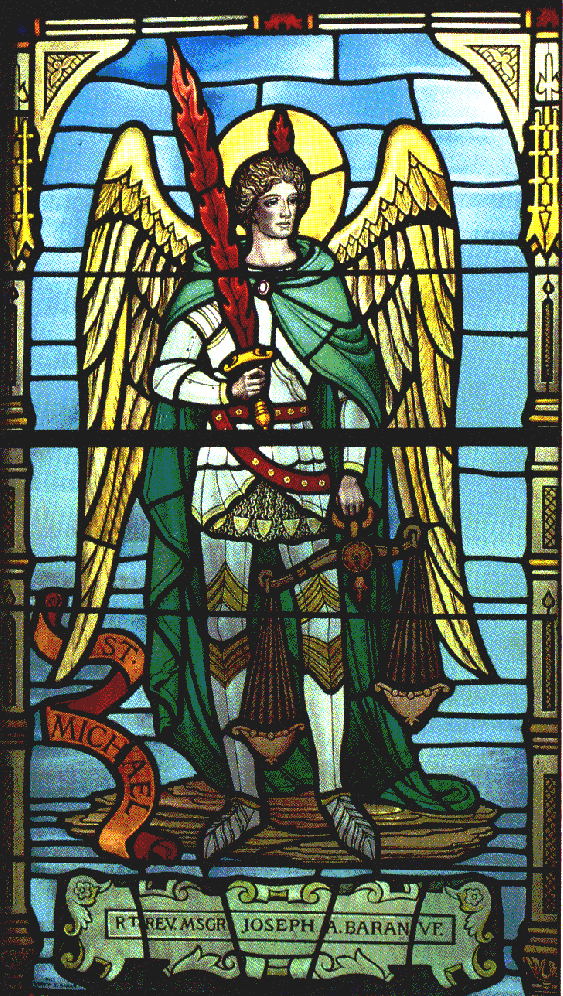
Patron Saint of Police Officers
Saturday, December 29, 2007
On Salvation, Part II
Posted by
Jerry S
at
9:28 AM
![]()
Subscribe to:
Post Comments (Atom)
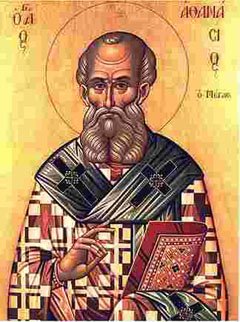
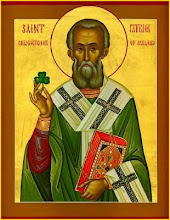


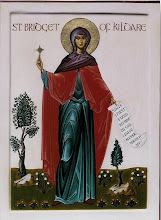

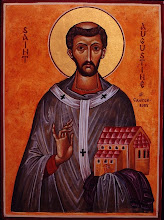

4 comments:
Very interesting and deep insight, Jerry. Thanks for that.
Somehow "once saved, always saved" has come to mean something very specific to me - that once we are claimed as one of His own, we truly are and do not depart from that. Can we sin again? We definitely will. But He knows the outcome and if we are truly saved by His Grace we will always return to Him, always, without fail.
Perhaps my logic is a bit circular, but I think it is simply. He knows who His sheep are and what they will do - and His sheep will always come back on bended knee to ask "forgive me, Lord!"
One who may have gone through the "rite" but has not truly turned it all over to the Shepard will not do so - and stands in mortal peril while Christ must weep.
Thanks for this insightful piece!
One of the best analogies regarding the "once-saved, always saved" doctrine goes something like this:
God's Grace is like a river, into which we are plunged headlong when we are baptized. We then are carried along in the current of His love, sometimes in the channel, and sometimes closer to shore. Because we have been given free will, we may elect to swim to the shore, climb out and walk inland, never to return.
I think that most of us spend our time in the shallower portions of the river- we receive His grace, but we never realize all of it, or its full power. Likewise, I believe that most of us, particularly in the years of our young adulthood, strike out for the shore and leave the river for some period of time, partly from rebellion against our parents, partly from the sense of immortality which typically characterizes youth, and partly because of peer pressure. Many, if not most, of us return, either periodically, or to stay. The trick is to stay in the deepest part of the channel, and not be pulled ashore by the Siren song of the world....
"Once saved, always saved" is a modern evangelical watering-down, as it were, of the Calvinist/Reformed understanding of "Perseverance of the the Saints". The last letter of the famous TULIP acronym. Those whom God predestines in Christ Jesus, and regenerates with His Holy Spirit can never truly walk away, though they may flounder from time to time. They are, as it were, a "slave" of grace.
It is something entirely different, then the OSAS doctrine as seen today. If you want to engage 'OSAS' historically, go back to the original well from which it sprang.
Another thing is that it seems to me that todays "OSAS" permits antinomianism, while the classical "P" does not. The key word is "perseverance", those whom are truly saved will persevere
So what do I think about "P"? I think there are places in the Scriptures (Hebrews especially) that provide at least a formidable challenge to it doctrinally, but as a good friend of mine used to say "Well, go ahead and just try walking away from the Lord.. see what happens".
Just try running from the Holy Spirit.. we'll leave the lights on for you at the Church when you get back.
Brett
<><
Knothead:
I enjoyed the illustration; however, I would not equate baptism with salvation, per se. I've known of too many cases where the baptised left the faith, never to return. Therein lies the flaw in the river analogy for me. If Christ is the Good Shepherd who leaves the 99 to go in search of the one, he would not let one of His sheep, one of His children, leave the "river" without going to bring them back. Perhaps my vision of the river would have a fence at the banks, which have enough elasticity to allow one to venture out of the water, only to be drawn back in by the fence. That may sound over-simplified, but there you have it.
Brett:
I would agree with your analysis of the OSAS doctrine in that it invites varying degrees of antinomianism. This is as much an error as those legalists on the opposite end of the spectrum. I agree that perseverence is a pivotal concept in the doctrine as originally stated. And yes, I agree with your friend that it is useless to run from God when you are His.
Peace,
<><
Post a Comment